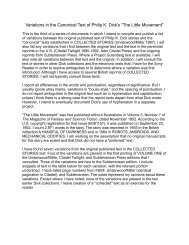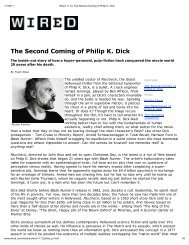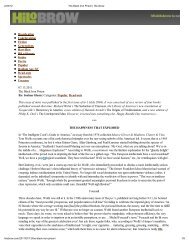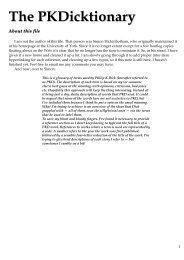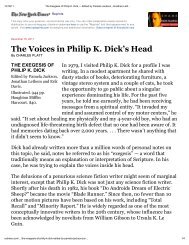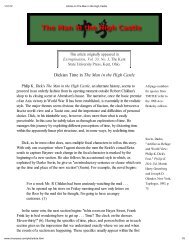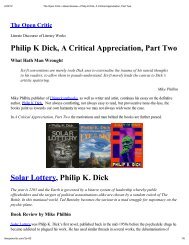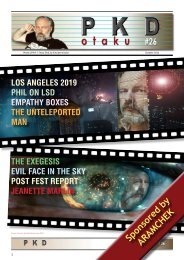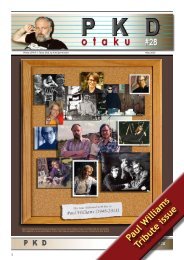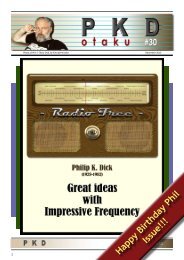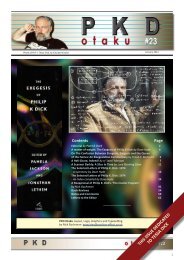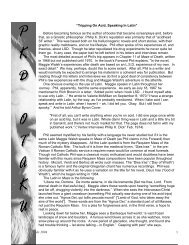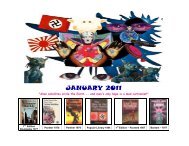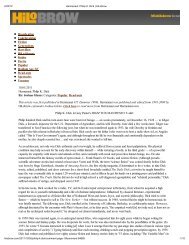PKD Otaku Issue 27 - Philip K. Dick Fan Site
PKD Otaku Issue 27 - Philip K. Dick Fan Site
PKD Otaku Issue 27 - Philip K. Dick Fan Site
You also want an ePaper? Increase the reach of your titles
YUMPU automatically turns print PDFs into web optimized ePapers that Google loves.
Editorial<br />
by Patrick Clark<br />
Whatever sort of world Phil K. <strong>Dick</strong> entered when<br />
he sat down to his typewriter, there was another<br />
world, a mundane place, waiting for him as soon<br />
as got out his chair. When we think about Phil I’m sure<br />
we are mostly swept up in his astonishing imagination but<br />
Phil was immersed in the real world, perhaps to a greater<br />
extent than most of us. Ex-wives, child support and alimony,<br />
the IRS, unreliable cars, trips to hospitals, dentist offices,<br />
grocery stores, trying to make a living in the science<br />
fiction business (a field that did not pay well at all), dealing<br />
with his agent, making the rent, various girlfriends, the<br />
Six O’clock news – he was utterly grounded in the here<br />
and now. And he mostly kept his head above water.<br />
Many, perhaps too many, essays concerning <strong>PKD</strong> dwell on<br />
the mystical/religious areas of Phil’s concerns or they examine<br />
a particular work in isolation from the rest of the<br />
world. Neither of these strategies is wrong, of course;<br />
most of my offerings fall in these categories. But Phi’s<br />
writings have much to say about right now in the concrete<br />
world outside our window. He was deeply concerned<br />
with the manipulation of speech for political and economic<br />
ends, with totalitarian governments and especially with<br />
the surveillance society. Phil’s attitude toward the cops<br />
was succinct: “’The police are our friend.’ The hell they<br />
are!” (LIES: chapter 1) There are no good cops in Phil’s<br />
work though there are occasionally sympathetic ones.<br />
For the most part cops are agents of oppression, the “Iron<br />
Heel” component of the ubiquitous surveillance camera.<br />
There is a chapter in FROLIX-8 where Nick Appleton is<br />
taken to police HQ and catches a glimpse of the television<br />
monitors tracking every aspect of life.<br />
The cop stepped through the doorway; Nick followed….and<br />
saw, in a single glimpse, the nervecenter<br />
of the police apparatus. TV screens, small,<br />
hundreds and hundreds of them, with a cop monitoring<br />
each cluster of four screens….<br />
“That room,” the rep of the Council Chairman<br />
said, “is the datasource for the PPS all over the<br />
planet. Fascinating, isn’t it? All those monitoring<br />
screens…and you’re seeing just a fraction of it;<br />
strictly speaking, you’re seeing the Annex, established<br />
two years ago. The central nerve-complex<br />
is not visible from here, but take my word for it, it’s<br />
appallingly large.”<br />
“’Appallingly’?” Nick asked, wondering at the<br />
choice of words. He sensed, weakly, a sort of sympathy<br />
for him on the part of the Council Chairman<br />
rep.<br />
“Almost one million police employees are maintained<br />
at the peep-peep screens. A huge bureaucracy.”<br />
“But did it help them?” Nick asked. “Today?<br />
When they made their initial roundup?”<br />
“Oh yes; the system works. But it’s ironically<br />
funny that it ties up so many men and man-hours,<br />
when you consider that the whole original idea was<br />
that –“<br />
A uniformed police occifer appeared beside the<br />
two of them. “Get out of here and get this man to<br />
the Council Chairman.” His tone was nasty. [Chapter<br />
15]<br />
When I first read this book in 1970, during the dark days<br />
of the Nixon Administration, that description sounded<br />
valid enough but also quite exaggerated. Were all those<br />
television monitors really possible? In fact it pretty much<br />
describes the CCTV world in which we now live.<br />
Phil saw it coming. It is an accident of history that Phil<br />
composed his books and short stories during the Age of<br />
the National Security State: the time of Joe McCarthy, the<br />
Vietnam War, Cointelipro, SDS, Black Panthers, CIA assassinations,<br />
Chicago, Nixon and Watergate. It was a tough<br />
time to live through and everyone, perhaps especially<br />
every writer, had to deal with it all. Phil certainly did: it<br />
permeates his works. This is an aspect of Phil that seldom<br />
gets explored. So by a happy coincidence this issue<br />
has two essays, by Nick and Dave, which look precisely at<br />
some real world aspects of Phil’s novels -- the weapons,<br />
the cameras, the thought police. I think Phil has much to<br />
tell us not only about the Cold War society but also about<br />
now, right here in 2013.<br />
<strong>PKD</strong>-CCTV by Nick Buchanan<br />
3<br />
He was facing a bureaucrat who operated by rote, whereas he struck through the layers of habit and hit directly.



